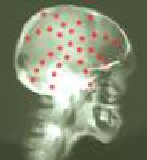
THURSDAY, April 15 (HealthDay News) — People who are missing large chunks of DNA on chromosome 16 have a greatly increased risk for developing epilepsy, researchers say.
“We found that the presence of this genetic variant is one of the strongest risk factors for all forms of epilepsy, possibly accounting for as many as 300,000 cases of epilepsy worldwide,” lead researcher Erin Heinzen, an assistant professor at the Center for Human Genome Variation at Duke University Medical Center, said in a news release from the center.
The researchers compared DNA from 3,800 people with epilepsy with DNA from 1,300 healthy people and found that 23 of those with epilepsy had deletions on chromosome 16 at 16p13.11. No such DNA deletions were found in healthy people, according to a report on the research, published online in the American Journal of Human Genetics.
Heinzen and her colleagues also found that the DNA deletion in those with epilepsy included seven genes and that at least one of the two copies of each of the genes was switched off.
“That means that the amount of protein normally produced by these genes is likely reduced in these patients,” Heinzen said.
Previous research found that genetic variations on this part of chromosome 16 are associated with a higher risk for schizophrenia, mental retardation and very specific forms of epilepsy. The researchers said that their study was the first to show that DNA deletion in this area is also linked with a wide range of epilepsy disorders.
“While the proportion of epilepsy explained by this deletion is small, at about half a percent, that still amounts to a huge number of patients globally,” Dr. Rodney Radtke, a neurologist and professor of medicine at Duke and a study co-author, said in the news release.
“The eventual impact on our understanding of what predisposes an individual to developing epilepsy could be much greater” as a result of these findings, Radtke said.
More information
The U.S. National Institute of Neurological Disorders and Stroke has more about epilepsy.

